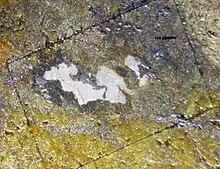| Polarite | |
|---|---|
 | |
| General | |
| Category | Alloys with PGE |
| Formula (repeating unit) | Pd,(Bi,Pb) |
| IMA symbol | Plr[1] |
| Strunz classification | 02.AC.40 |
| Crystal system | Orthorhombic |
| Crystal class | Pyramidal (mm2) (same H-M symbol) |
| Space group | Ccm21 |
| Unit cell | a = 7.19 Å, b = 8.69 Å, c = 10.68 Å; Z = 16 |
| Identification | |
| Color | White with yellowish tint |
| Crystal habit | Disseminated grains (microscopic) |
| Mohs scale hardness | 3.5 - 4 |
| Luster | Metallic |
| Streak | White |
| Diaphaneity | Opaque |
| Specific gravity | 12.51 |
| References | [2][3][4][5] |
Polarite, is an opaque, yellow-white mineral with the chemical formula Pd,(Bi,Pb). Its crystals are orthorhombic pyramidal, but can only be seen through a microscope. It has a metallic luster and leaves a white streak. Polarite is rated 3.5 to 4 on the Mohs Scale.[3][4]
It was first described in 1969 for an occurrence in Talnakh, Norilsk in the Polar Ural Mountains in Russia.[3] It has also been recorded from the Bushveld igneous complex of South Africa and from Fox Gulch, Goodnews Bay, Alaska.[4]
References
- ↑ Warr, L.N. (2021). "IMA–CNMNC approved mineral symbols". Mineralogical Magazine. 85 (3): 291–320. Bibcode:2021MinM...85..291W. doi:10.1180/mgm.2021.43. S2CID 235729616.
- ↑ Mineralienatlas
- 1 2 3 Webmineral data
- 1 2 3 Handbook of Mineralogy
- ↑ Mindat.org
This article is issued from Wikipedia. The text is licensed under Creative Commons - Attribution - Sharealike. Additional terms may apply for the media files.